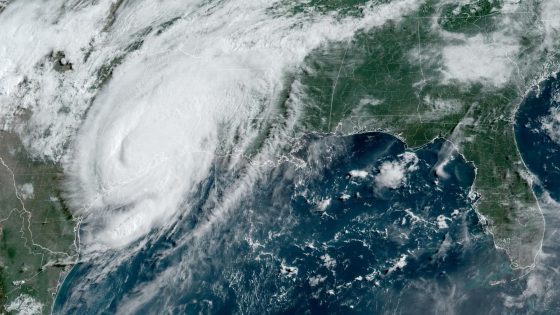A Hurricane warning sign is pictured in Corpus Christi, Texas, U.S. July 7, 2024.Â
Daniel Becerril | Reuters
Tropical Storm Beryl sped across the Texas coast on Monday, leaving more than 2 million people and businesses without power in the Houston area and unleashing heavy rains that prompted dozens of high-water rescues. The fast-moving tempest threatened to carve a harsh path over several more states in coming days.
Within hours after Beryl swept ashore as a Category 1 hurricane, it had weakened into a tropical storm, far less powerful than the Category 5 behemoth that tore a deadly path of destruction through parts of Mexico and the Caribbean last weekend.
But the winds and rains of the fast-moving storm were still powerful enough to knock down hundreds of trees that had already been teetering in water-saturated earth and to strand dozens of cars on flooded roadways.
At least two people were killed when trees fell on homes, and the National Hurricane Center said damaging winds and flash flooding would continue as Beryl pushes inland. There were no immediate reports of widespread structural damage, however.
Hurricane Beryl moves inland after making landfall in Texas, U.S. in a composite satellite image July 8, 2024.Â
NOAA | Via Reuters
More than 2.2 million homes and businesses were without power around Houston, the nation’s fourth-largest city, after Beryl blew through, according to the CenterPoint Energy utility. For many, it was an all-too-familiar experience: Powerful storms had just ripped through the area in May, killing eight people, leaving nearly 1 million without power and flooding numerous streets.
Residents without power after Beryl were doing their best.
“We haven’t really slept,” said Eva Costancio as she gazed at a large tree that had fallen across electric lines in her neighborhood in the Houston suburb of Rosenberg. Costancio, 67, said already been without power for several hours and worried that food in her refrigerator would be spoiled.
“We are struggling to have food and losing that food would be difficult,” she said.
Houston and Harris County officials said power crews would be sent into the area to restore service as quickly as possible, an urgent priority for homes also left without air conditioning in the middle of summer. Temperatures, which had cooled slightly with the storm, were expected to reach back into the 90s as early as Tuesday.
“While these efforts are full steam ahead, we want residents to know and prepare for a possible multi-day power outage,” Galveston city officials said on Facebook. “The estimated timeline is anywhere from 72 hours to two weeks in parts of the island.”
Rain and swells from Hurricane Beryl approach homes along Surfside Beach, Texas, U.S., July 7, 2024.Â
Adrees Latif | Reuters
Beryl’s rains pounded Houston and other areas of the coast on Monday, reclosing streets in neighborhoods that had already been washed out by previous storms. Television stations on Monday broadcast the dramatic rescue of a man who had climbed to the roof of his pickup truck after it got trapped in fast-flowing waters. Emergency crews used an extension ladder from a fire truck to drop him a life preserver and a tether before moving him to dry land.
Houston officials reported at least 25 water rescues by Monday afternoon, mostly for people with vehicles stuck in floodwaters.
“First responders are putting their lives at risk. That’s what they’re trained for. It’s working,” Houston Mayor John Whitmire said.
Javier Mejia was one of about 20 people who gathered near the pickup truck rescue site to take pictures of other submerged vehicles sitting on the flooded highway.
“If you don’t have a way through, you’re going to get stuck like that,” Mejia said.
Having experienced previous storms in Houston, Mejia stocked up on food and water before Beryl hit, but forgot gas for his portable generator. He planned to spend the day looking for some.
“I don’t want it to go bad,” he said of the food, adding that if he can’t find gas, “We can just fire up the grill.”
People evacuate and move belongings out ahead of the expected landfall of Tropical Storm Beryl on Sunday, July 7, 2024, in Port O’Connor. (Jon Shapley/Houston Chronicle via Getty Images)
Jon Shapley | Hearst Newspapers | Getty Images
Many streets and neighborhoods throughout Houston were littered with fallen branches and other debris. The buzz of chainsaws filled the air Monday afternoon as residents set to work chopping up knocked-down trees and big branches that had blocked streets and sidewalks.
Two people were killed after trees fell on their houses: a man in the Houston suburb of Humble and a woman in Harris County, authorities said. Hundreds of trees fell in the county, crushing vehicles and damaging homes, said Precinct 4 County Constable Mark Herman.
Texas Lt. Gov. Dan Patrick, who is acting governor while Gov. Greg Abbott is out of the country, warned that flooding could last for days as rain continued to fall on already saturated ground.
“This is not a one-day event,” he said.
President Joe Biden was getting regular updates on the storm after it made landfall, the White House said. The U.S. Coast Guard and FEMA had prepared search and rescue teams, and FEMA collected bottled water, meals, tarps and electric generators in case they are needed.
Several companies with refineries or industrial plants in the area reported that the power disruptions necessitated the flaring of gases at the facilities.
Marathon Petroleum Corp. said it conducted a “safe combustion of excess gases” at its Galveston Bay Refinery in Texas City, but did not provide information on the amount of gas flared or how long it would continue. Formosa Plastics Corporation and Freeport LNG also reported flaring related to Beryl, according to the Texas Commission on Environmental Quality.
A couple sit on the beach before the arrival of Tropical Storm Beryl in Corpus Christi, Texas on July 7, 2024.Â
Mark Felix | Afp | Getty Images
Companies have 24 hours to share emissions data after the flaring stops, a representative from the TCEQ said in an email.
The earliest storm to develop into a Category 5 hurricane in the Atlantic, Beryl caused at least 11 deaths as it passed through the Caribbean on its way to Texas. The storm ripped off doors, windows and roofs with devastating winds and storm surge fueled by the Atlantic’s record warmth.
Three times during the week, Beryl gained 35 mph (56 kph) in wind speed in 24 hours or less, the official weather service definition of rapid intensification.
Beryl’s explosive growth into an unprecedented early whopper of a storm indicates the hot water of the Atlantic and Caribbean and what the Atlantic hurricane belt can expect for the rest of the storm season, experts said. In Jamaica, officials said Monday that island residents will have to contend with food shortages after Beryl destroyed over $6.4 million in crops and supporting infrastructure.
In Louisiana, heavy bands of rain were expected all day Monday and “the risk is going to be for that heavy rainfall and potential for flash flooding,” National Weather Service meteorologist Donald Jones said in a Monday morning Facebook Live briefing.
Meteorologists in Louisiana are watching for lingering rainbands, which could drop copious amounts of rain wherever they materialize, as well as “quick, spin-up tornadoes,” said Donald Jones, a National Weather Service meteorologist in Lake Charles, Louisiana.
“It’s just a matter of exactly where that’s going to be,” Jones said. “That’s very difficult to predict more than maybe an hour or so in advance.”
Beryl was forecast to bring more strong rain and winds into additional states over the coming days. One of those, Missouri was already dealing with a wet summer. Heavy rains unrelated to the storm prompted several water rescues around the city of Columbia, where rivers and creeks were already high ahead of Beryl’s expected arrival on Tuesday.
Source Agencies


